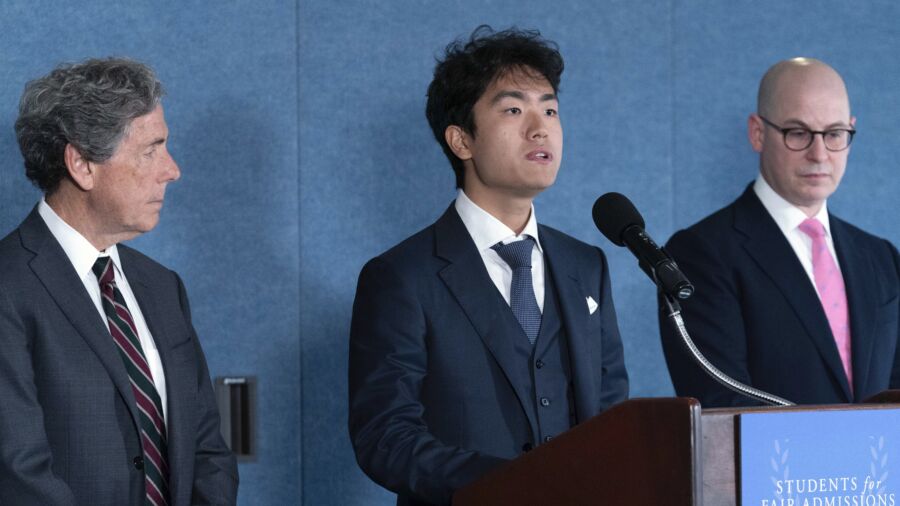Edward Blum, the legal strategist who successfully challenged race-based college admissions programs in the U.S. Supreme Court, is now suing two high-powered law firms over fellowship programs he argues are racially discriminatory.
The American Alliance For Equal Rights (AAFER), an organization founded by Mr. Blum, filed two different federal lawsuits on Tuesday, challenging the diversity fellowships by the international law firms Perkins Coie LLP and Morrison & Foerster LLP.
AAFER filed its lawsuit (pdf) against Perkins Coie in the U.S. District Court for the Northern District of Texas. The lawsuit specifically targets a pair of “diversity fellowships” for first and second year law students, alleging they exclude certain applicants based on their race.
“These fellowships offer recipients a six-figure job that include five-figure stipends. However, applicants do not qualify unless they are ‘students of color,’ ‘students who identify as LGBTQ+,’ or ‘students with disabilities,'” AAFER stated. “This means that between two heterosexual, nondisabled applicants, one black or Hispanic, and the other one who [is] white, the latter cannot apply based solely on his race.”
AAFER filed its lawsuit (pdf) against Morrison & Foerster LLP in the U.S. District Court for the Southern District of Florida. That lawsuit goes after the firm’s Keith Wetmore Fellowship for first-year law school students, noting people ere excluded from applying from the fellowship unless they are “African American/Black, Latinx [sic], Native Americans/Native Alaskans, and/or members of the LGBTQ+ community”—a standard that similarly excludes white heterosexual applicants.
These lawsuits come less than two months after the Students For Fair Admissions (SFFA), another organization founded by Mr. Blum, won a Supreme Court case seeking to strike down race-based affirmative college admissions policies, SFFA v. Harvard.
“This kind of rank discrimination was never lawful, even before SFFA v. Harvard held that colleges cannot use race in admissions,” both of AAFER’s complaints said of the respective fellowships they sought to challenge. AAFER specifically said the fellowships they were challenging violated federal laws implemented under the Civil Rights Act of 1866.
The lawsuits seek a federal court judgment declaring the fellowships to be in violation of that law, and permanently block the two law firms from enforcing racially discriminatory eligibility requirements, or considering race as a factor when selecting their fellows.
“Excluding students from these esteemed fellowships because they are the wrong race is unfair, polarizing and illegal,” Mr. Blum said in a Tuesday press statement. “Law firms that have racially-exclusive programs should immediately make them available to all applicants, regardless of their race.”
NTD News reached out to Perkins Coie and Morrisonn & Foerster for comment, but neither lawfirm responded by the time this article was published.
Race-Based Programs Come Under New Scrutiny
Mr. Blum has continued to challenge race-based programs in the weeks since the Supreme Court decision in SFFA v. Harvard. In the immediate aftermath of the Supreme Court case, Mr. Blum said he and the SFFA would be on the lookout for universities either flouting the Supreme Court’s ruling or creating admissions categories that create “direct proxies for racial classifications.”
Earlier this month, AAFER filed a lawsuit (pdf) challenging Fearless Fund Management LLC, a venture capital firm that awards grants to small businesses. Like its lawsuits against Perkins Coie and Morrison & Foerster, the AAEFA alleges Fearless Fund violates the provisions of the Civil Rights Act of 1866 by excluding applicants based on race.
Fearless Fund has a grant application page that explicitly states the grant is “open to black women” and lists as the first eligibility requirement that the “business must be at least 51% black woman owned.” AAER alleges the program rules discriminate against two of its members, who are unable to apply for the grant because they are not black women.
“I think it’s going to be a stretch to explain why Hispanic and Native American women are not eligible, as well as Asian and white women,” Mr. Blum said of the Fearless Fund’s grant eligibility requirements.
The NAACP Legal Defense Fund and the National Women’s Law Center have stepped in to defend the Fearless Fund against the lawsuit, as have civil rights attorneys Ben Crump and Alphonso David.
Mr. David called the lawsuit “cynical,” while Mr. Crump said the case was “a frivolous attempt to prevent progress from winning.”
Reuters contributed to this article.

